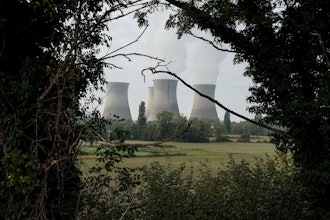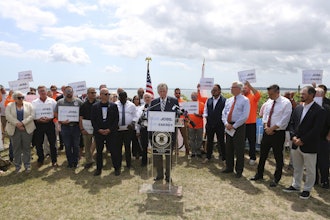
SIOUX FALLS, S.D. (AP) — The massive carbon capture pipeline in the Midwest was thrown into uncertainty Tuesday after South Dakota’s Public Utility Commission denied its route permit application.
The commission voted 2-1 to deny the application by Iowa-based Summit Carbon Solutions, with Commissioner Kristie Fiegen saying it was “not ready to go forward” and lacked “the form and content required.”
“The PUC’s duty is to make a decision based on a route — one route,” said Fiegen, who initiated the motion to deny. “The current route, in my view, is not viable.”
South Dakota lawmakers passed an eminent domain ban for carbon capture pipelines in March that made Summit’s planned route difficult, commissioners agreed. After Tuesday's decision, Summit said it will refile its application with a reduced route in South Dakota to satisfy landowners and ethanol plant partners.
“While we are disappointed in today’s decision, we remain committed to South Dakota as without it the ethanol industry, farmers, and land values in the state will all suffer,” the company said in a statement.
South Dakota is a crucial part of the 2,500-mile pipeline, estimated to cost $8.9 billion. The pipeline would transport carbon emissions from ethanol plants in Iowa, Minnesota, Nebraska, North Dakota and South Dakota to be stored underground permanently in North Dakota. The project already has approvals in Iowa, Minnesota and North Dakota, and Summit has invested more than $150 million into its route in South Dakota.
Landowners rejoiced over the Tuesday decision.
“Today is a victory for South Dakota landowners and local control," Dakota Rural Action board member Ed Fischbach said in a statement. "We are grateful the PUC has made this common sense decision and freed landowners to get on with their lives and businesses.”
Summit had previously requested a timeline extension on its permit application to rework its route in a way that would satisfy landowners.
Questions about the pipeline arose after South Dakota lawmakers approved a ban on eminent domain for carbon capture projects, in which the government can seize private property with compensation. Without that power, Summit would need to secure voluntary agreements with landowners along the South Dakota route.
In its filing for an extension, Summit said it would work with landowners and the state in “good faith” rather than challenge the eminent domain ban. That statement convinced commissioners that there was no path forward for Summit given the amount of landowner opposition along the current route.
Instead of pursuing legal action against the state, Summit said in its filing that additional time would allow it to “roll out new offers to landowners” and identify which branches to ethanol plants it can eliminate that face significant landowner opposition.
The ethanol industry is concentrated in the Midwest, with nearly 40% of the nation’s corn used to brew ethanol. By sequestering carbon in North Dakota, Summit’s pipeline promises to lower the carbon intensity of ethanol and make it more competitive as a sustainable product.






















